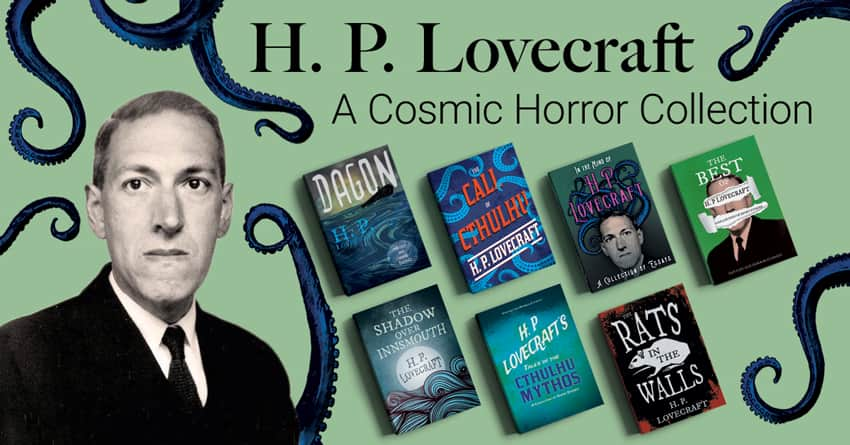
When exploring the history of horror fiction, one name rises above the fog of forgotten authors: H.P. Lovecraft. Known for crafting an entirely new kind of horror—one rooted not in gore, ghosts, or vampires, but in the unimaginable vastness of the cosmos—Lovecraft shaped modern horror in ways that still echo in books, films, and video games today. The legacy of H.P. Lovecraft is not simply one of storytelling—it’s a legacy of philosophy, dread, and a unique literary universe where mankind is but a fragile whisper in the cosmic void.
The Strange Life of a Reclusive Genius
Howard Phillips Lovecraft was born in 1890 in Providence, Rhode Island, where he spent nearly all his life. From a young age, he was steeped in classical literature, astronomy, and ancient mythologies. Raised in a household shadowed by mental illness—both his father and mother were institutionalized—Lovecraft turned inward, developing a rich imagination that would eventually fuel his otherworldly tales.
Though he started writing early, he didn’t achieve literary fame during his lifetime. His work mostly appeared in pulp magazines like Weird Tales. Still, those seemingly modest publications were enough to plant the seeds for what would become an empire of mythos and mystery.
The Birth of Cosmic Horror
H.P. Lovecraft didn’t invent horror, but he redefined it. Traditional horror fiction had always focused on physical threats—monsters, murderers, ghosts. Lovecraft looked deeper, asking what would happen if we discovered that the universe is governed by forces utterly indifferent to us. The answer? Madness.
This fear of the unknown birthed a new genre: cosmic horror. In stories like The Call of Cthulhu, The Shadow over Innsmouth, and At the Mountains of Madness, Lovecraft introduced beings so ancient and alien that simply knowing they exist could break a human mind. His work suggested that knowledge itself could be a curse—that some truths were never meant to be discovered.
The Cthulhu Mythos: A Universe of Terror
Central to the legacy of H.P. Lovecraft is the Cthulhu Mythos, a shared fictional universe inhabited by god-like entities such as Cthulhu, Nyarlathotep, and Azathoth. These beings are not malevolent in the traditional sense—they simply exist on a scale so vast that they render humanity insignificant.
Cthulhu, perhaps the most famous of Lovecraft’s creations, lies sleeping beneath the ocean in the sunken city of R’lyeh, waiting for the right cosmic alignment to awaken. This idea—that the real danger is not death, but knowledge and exposure to what should remain hidden—pervades his stories.
This mythos has grown far beyond Lovecraft’s original works. Writers like August Derleth, Stephen King, and Neil Gaiman have expanded it. Today, it inspires everything from role-playing games like Call of Cthulhu to critically acclaimed films and television shows.
Writing Style: Atmosphere Over Action
One hallmark of Lovecraft’s work is his distinct, often archaic, prose. He favored long sentences, antiquated vocabulary, and richly detailed descriptions. While his style can be dense, it’s also immersive. Lovecraft was less concerned with fast-paced plots than with cultivating a mood of creeping dread.
His narrators—often scholarly types or curious investigators—rarely end up victorious. Instead, they descend into madness, forever scarred by what they’ve uncovered. Through them, Lovecraft explored the limits of human perception and the terror of realizing we are not the masters of the universe.
Posthumous Rise to Fame
Although he died in poverty in 1937, Lovecraft’s influence only grew after his death. His peers, notably August Derleth and Donald Wandrei, founded Arkham House to publish his stories in hardcover, preserving and promoting his work for new audiences.
By the late 20th century, Lovecraft had become a towering figure in speculative fiction. His tales have been studied in academic settings, adapted into films like The Thing and The Mist, and referenced in everything from HBO’s Lovecraft Country to Marvel Comics.
This posthumous popularity is part of the ever-expanding legacy of H.P. Lovecraft, which continues to inspire fear, fascination, and philosophical debate.
Controversies and Re-evaluation
However, no discussion of Lovecraft would be complete without acknowledging the serious issues surrounding his personal views. Lovecraft held openly racist and xenophobic beliefs, and elements of these ideologies appear in some of his stories.
Modern readers and creators grapple with this uncomfortable truth. Some have chosen to confront and subvert these themes, using Lovecraft’s mythos to tell inclusive and empowering stories. Others debate whether we can separate an artist’s work from their personal values.
Despite the discomfort, this critical engagement with his legacy is a sign of growth—not just in the horror community, but in literature as a whole.
Cultural Legacy and Modern Influence
Today, Lovecraft’s work continues to shape not only literature but also cinema, video games, and music. From Bloodborne and The Call of Cthulhu video games to bands like Metallica referencing the Necronomicon, the tendrils of his cosmic horror reach into every corner of pop culture.
Festivals like NecronomiCon Providence celebrate his contributions, drawing fans from around the world. Scholars publish essays analyzing his themes, while emerging writers reinterpret his mythos through fresh perspectives. The legacy of H.P. Lovecraft is alive and mutating—just like the creatures he imagined.
Outbound Links for Further Reading
-
The H.P. Lovecraft Archive: Extensive resources on Lovecraft’s life and work
-
British Library on Weird Fiction: A literary look at Lovecraft’s influence
-
HBO’s Lovecraft Country: A modern reinterpretation of Lovecraftian themes
-
Chaosium Games: The tabletop RPG that brought the mythos to gaming
Frequently Asked Questions
Q: What is cosmic horror, and how did Lovecraft define it?
A: Cosmic horror is a genre that emphasizes the insignificance of humans in the vast universe. Lovecraft defined it through stories that exposed terrifying, incomprehensible truths.
Q: Why is the Cthulhu Mythos so influential?
A: Because it offers a detailed, interconnected universe that can be endlessly expanded, and reflects existential dread in a uniquely chilling way.
Q: Was Lovecraft famous during his lifetime?
A: No. He was largely unknown and financially unsuccessful. His fame grew only after his death.
Q: Are there modern adaptations of Lovecraft’s work?
A: Yes, including films (The Color Out of Space), games, TV series (Lovecraft Country), and novels that reinterpret or expand on his ideas.
Q: How should readers approach Lovecraft’s problematic views?
A: With awareness. Many creators now engage with his mythos critically, acknowledging both its genius and its flaws.





